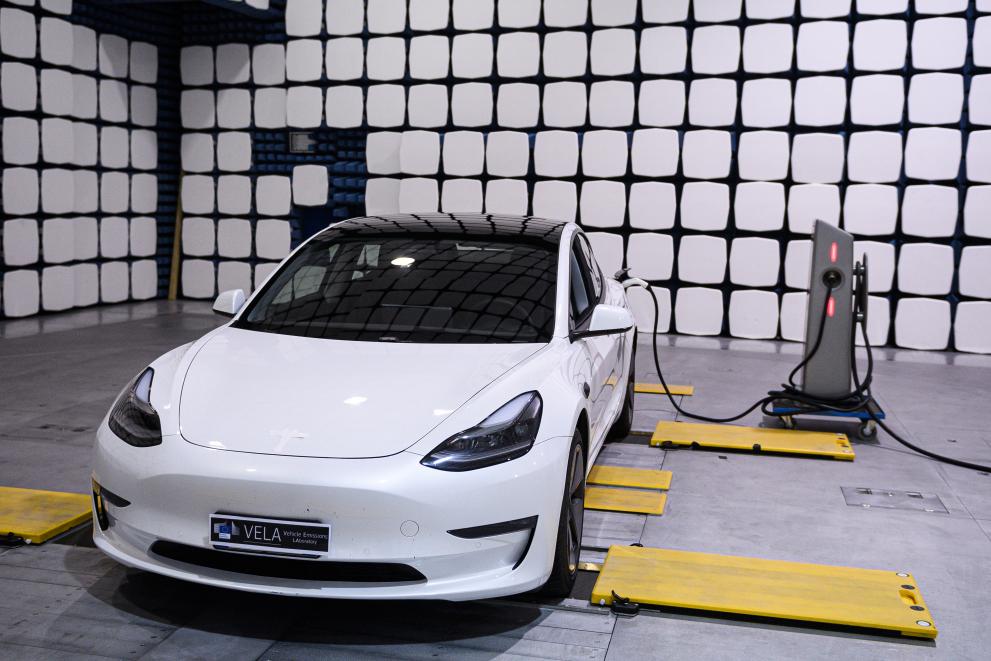
This will help the Commission to determine whether vehicles comply with relevant EU emissions regulations, improving its ability to conduct market surveillance of vehicles. The Commission's competence to check emissions from cars is the result of the overhaul of the EU vehicle type approval legislation in the wake of the « Dieselgate » scandal, which introduced oversight and enforcement at EU level.
Inaugurating the new facility at Ispra, Commissioner for Internal Market, Thierry Breton, said: “While controls of cars placed on the market are Member States' responsibility, since September 2020 the Commission is able to carry out checks on cars, trigger EU-wide recalls, and impose fines of up to €30,000 per car when the law is broken. With this new state-of-the-art car emission testing facility, we are now better equipped than ever to improve air quality for European citizens, restore consumer confidence, strengthen the Single Market and support the global competitiveness of Europe's car industry.”
Commissioner for Innovation, Research, Culture, Education and Youth, Mariya Gabriel, said: "These new top-notch laboratories will allow the JRC to continue, with increased efficiency, to ensure that cars comply with emission rules in the EU. It is great news for all consumers and Europeans, and a step forwards towards the ambition to become a climate neutral continent by 2050. Another important example on how science helps policy.”
The new Vehicle Market Surveillance facility will enable emissions testing in regulated and simulated real driving conditions. Two climatic emission cells will allow testing a wide range of ambient conditions such as temperature, humidity and pressure, which affect the final emissions performance of the vehicle. Due to their state of the art technology, the new labs will also serve the Commission in view of implementing future emission standards.
The Commission is also publishing the results of the first year of the JRC's market surveillance activities carried out in the JRC's other testing facilities. The report, entitled 'European market surveillance of motor vehicles', presents emissions test results and the compliance assessment for 40 Euro-6 vehicles, found to comply under a wide range of driving conditions. In support to the EU authorities involved in the surveillance duties on motor vehicles, the JRC also shares lessons learnt and best practices for the testing procedures.
Background
In response to the « Dieselgate » scandal that revealed that real driving emissions in some cases far exceeded values measured in the legislative certification test, the European Union in May 2018 adopted the Regulation (EU) 2018/858 on the approval and market surveillance of motor vehicles. This Regulation significantly overhauls and tightens the previous system of type approval by introducing a mandatory market surveillance of motor vehicles. It also improves the quality and independence of vehicle type-approval and testing, increases checks of cars already on the EU market and strengthens the overall system with greater European oversight. Based on the results of its market surveillance activities, the 2018 Regulation on vehicle type approval allows the Commission to trigger EU-wide recalls of vehicles and impose fines of up to €30,000 per car when the law is broken and Member States fail to act.
The JRC's Vehicle Emissions Laboratory (VELA) enables all types of road vehicles to be tested for both emissions and energy efficiency. The VELA laboratory, now consisting of 11 facilities, and the JRC's research results are used to develop European emissions legislation for road transport, generating unbiased scientific data for the evaluation of vehicle technologies. The JRC ran a pilot project from 2017 to 2020, when the Commission became finally responsible for vehicle testing in the context of vehicle market surveillance.
For More Information
Vehicle Market Surveillance Facilities
New rules on cleaner and safer cars start to apply across Europe
Video: Safety Market Surveillance Testing in realistic conditions
EbS coverage of Commissioner Breton's presser at ISPRA
Details
- Publication date
- 1 April 2022
- Author
- Representation in Cyprus
